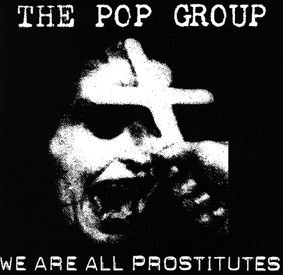
"It could have something to do with the fact that this is a compilation, but I still don’t buy it: judging from the tracklist of the other Pop Group LPs and comps, there’s not much of a difference here in terms of creating false cohesion, of bridging the lapses in a band’s output through the usual selective-memory procedures (Swell Maps, I’m looking in your direction)—everything seems to come from the same year or so, there’s a B-side here, but not much in the way of alternate mixes or singles-only tracks. In other words, there’s nothing that says the band couldn’t have put out this exact collection sometime before they imploded in 1980 or 1981. Therefore I have to conclude that this band just got a lot better: judging, after all, from the sporadically incoherent yet consistently bewildering Y, I was not sure if another Pop Group release was what I needed, at least right now. But here’s the incredible thing: whether it was because they spent more time hanging out with the Slits, or less listening to Crass and more listening to King Tubby, listening to this record is like watching the stoner in the back of your high school physics class suddenly start throwing out incisive questions about grand unified field theory. In short, it’s a tighter, far more accessible album that has the effect of retaining the righteous-activist’s indignation of Y while fusing the band’s unstable compound of disparate elements together into a listenable whole, intelligent enough not to fixate on the mirage of radical implications that often surround making inaccessible noise for its own sake.
The record certainly starts out letting one think the band’s succumbed to the seductions of fucking around: the indecipherable spoken sample and clattering rhythm track that begins “We Are All Prostitutes” in an appropriately extreme and caustic fashion is just deranged and alienating enough to make all who probably couldn’t make it through this album bail out immediately. But a minute into the track, a straightforward and well-conceived lyrical assault (“Aggression / Competition / Consumer fascism! / Capitalism is the most barbaric of our religions!”) rides atop what becomes a gutted-out disco bounce, replete with touches of scraping violin.
“Blind Faith” features an acute, head-spinning bass-and-drums groove that finally seems to realize the band’s promise of hybridizing JB’s, Gang of Four, and murky Kraut-inspired avant-ism: as Spartan yet instantly propulsive as anything recorded by ESG, the sinisterly muttered lyrics and threnodic horns take things in a grisly direction, yet the gradual acceleration of the track allows the ever-tight musicianship to expand itself in several directions at once without degenerating; an unexpectedly lovely percussive guitar coda that recalls Steve Reich is a welcome addition. “Justice,” another funk-driven track that’s heavy on the hi-hats, wah-pedal, and mind-bending noise effects in equal measure, features Mark Stewart’s most effectively, specifically exasperated vocal yet, railing against kangaroo courts, military aggression, imperialistic measures taken against Zimbabwe and Ireland. His saddened, I’ve-been-teargassed-too-many-times cries of “Who polices the police?” even echo Fela Kuti.
“Amnesty Report” sets just that—a report from Amnesty International of atrocities inflicted by the British on IRA members taken prisoner—atop an endlessly mutating, twitchy funk-and-percussion track that, while a tad Zappaesque and heavy on the found-sound spew, is one of the band’s most creative. Stewart here sounds colder, more sure of his convictions, than ever; if there was a campy and Jello-Biafra-like bemusement to be found in his previous vocals, there is, understandably, not a touch of it here. After that track grinds to a sudden halt, “Feed the Hungry” kicks in with an effective mixture of dancefloor groove and Remain in Light keyboard-drone psychedelia; Stewart again namechecks geographical locations of atrocity, all of which has is tersely broken down for the listener as follows: “The rape of the third world / World Bankers decide / Who lives and who dies.” (Even though the Illuminati is invoked, we can overlook it in this case.)
Breakneck, coming-apart-at-the-seams punk and bridge-burning funk are approximated on “Forces of Oppression,” which sounds a bit like “Give It Up and Turn It Loose” played by Ornette Coleman’s band circa his funky-catastrophe landmark Body Meta. It’s tracks like this one that require a cooldown like the sinister dub number “No Spectators,” a possibly Situationist-inspired indictment of all whose silent passivity implicates in atrocity. Of course, this is a heady charge to level against one’s audience, and it’s thankfully tempered throughout the course of the album to avoid simple dogmatism. The rousing, unexpectedly upbeat singalong of “Where There’s A Will” may be the highlight among all the offerings here; I can think of no more convincing offering of the post-punk era’s ability to assimilate what would appear to be incongruous idioms. Some delirious, downright Ohio-Players-esque guitar-and-bass runs and oddball Latin percussion keeps things appropriately joyous in the midst of struggle. Even if it’s a bleak one, it’s a party to which everyone’s invited."
Psycho crazy funked up political PUNK? You bet your ass.
EDIT: link fixed. my bad.
Where there's a will










No comments:
Post a Comment